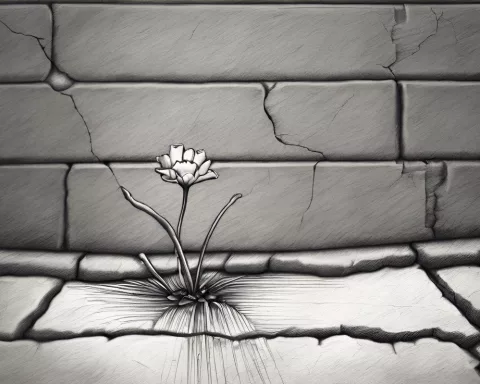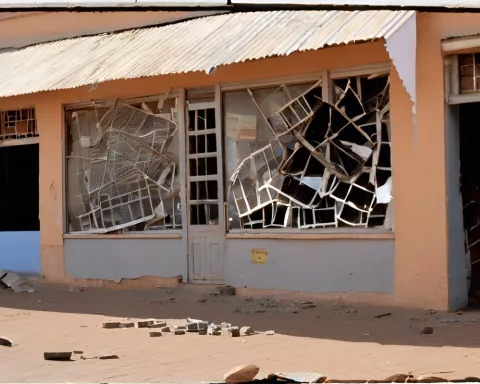Cape Town, South Africa is a city of contrasts, with both beauty and violence coexisting. The 2023 Violence Survey, a collaborative initiative, reveals the impact of violence on the city’s workforce and social milieu, highlighting an unseen epidemic of terror and post-traumatic stress. The survey exposes the far-reaching effects of violence on communities, including job loss, absenteeism, and psychological trauma. Despite these challenges, the city’s resilient inhabitants persevere in the face of adversity and work towards a better future.
Unearthing the darkness that lies beneath Cape Town’s vibrant exterior is the 2023 Violence Survey. This collaborative initiative offers an in-depth exploration of the grievous effects of violence on South Africa’s workforce, their mental wellness, and the overarching social milieu. The survey puts forth an alarming picture of a nation wrestling with an unseen epidemic of terror and post-traumatic stress.
The dawn breaks over Cape Town, the pulsating heart of South Africa, infusing it with its warm rays. This vibrant city, often referred to as the “Mother City”, presents a paradox of co-existing realities. While it’s celebrated for its stunning landscapes, booming industry, and rich cultural heritage, a more somber narrative unfolds behind the scenes. This story is about the struggle with widespread violent crime that infiltrates every facet of society, from the lively townships of Kraaifontein and Bellville to the corporate world in Kuils River.
The 2023 Violence Survey: A Spotlight on Impact and Insights
Unearthing the darkness that lies beneath Cape Town’s vibrant exterior is the 2023 Violence Survey. This collaborative initiative by RCS, BNP Paribas, and the Whitaker Peace and Development Initiative (WPDI) offers an in-depth exploration of the grievous effects of violence on South Africa’s workforce, their mental wellness, and the overarching social milieu. Targeting diverse sectors such as construction, retail, hospitality, and financial services, the survey puts forth an alarming picture of a nation wrestling with an unseen epidemic of terror and post-traumatic stress.
Sandy Richardson, a veteran human resources executive, elucidates the prime goal of the survey: to reveal the often-hidden impact of violence on vulnerable communities and their local economies. The crime issue in South Africa is a singular one, deeply rooted in socio-economic disparities. Tonia Pavlou, the Chief Financial Officer of RCS, insightfully observes that the crime predicament of South Africa is closely tethered to its stagnated economic growth and high Gini coefficient, an index that measures income inequality.
Unsettling Realities and Global Rankings
The brutal truth uncovered by the survey is disconcerting: a staggering 77% of participants feel insecure within their own communities. A majority attribute the escalating crime rate to load shedding and the skyrocketing cost of living. Contradictions abound within the crime statistics, with minor surges in common assaults, robbery, and other contact crimes, alongside slight dips in murder and rape incidences. However, the rate of attempted sexual offences displayed a distressing increase of 4.3%.
On the international front, South Africa’s standing is equally alarming. With a ranking of 130th out of 163 on the 2023 Global Peace Index, and 144th on the Safety and Security Index, the country grapples with daunting challenges tied to crime, political turbulence, and unchecked violence. Another disconcerting trend is a 10% decline in cases reported to police, underlining the growing chasm and mistrust between the public and law enforcement.
Siphathisiwe Dhlamini, a specialist in conflict resolution and peace-building at WPDI, asserts that “consumers are more inclined towards self-protection as opposed to community partnerships in combating violence.” Violence has infected the core of the community, impairing both the psychological and physical capacities of the people to effectively carry out their job roles.
The Crime Ripple Effect: Jobs, Education, and Corporate Sector
The survey exposes the far-reaching effects of violence on communities. It discloses a worrying statistic: 49% of men and 32% of women have either been laid off from their jobs or suffered a cut in their income due to violence. In the education sector, a shocking 70% of students have reported recurring absenteeism or tardiness. The long arm of violence extends into the corporate world, with a surge in absenteeism rates, 58% of which can be attributed to community violence.
Clearly, violence casts a dark shadow over South Africa’s workforce, undermining their mental health, productivity, and overall well-being. An urgent call to action is necessary, calling for cooperation among community members, law enforcement, and corporations to support victims and confront the violence proactively. This strategy should encompass empathetic training for law enforcement and an effort from corporations to promote mental well-being and resilience.
Toward a New Dawn: Rising Above Challenges
As the vibrant day in Cape Town transitions into dusk and the sun retreats beyond the horizon, the struggle against violence persists. However, the city, mirroring its resilient inhabitants, is characterized not by its difficulties, but by its ability to persevere despite them. A new dawn can only be seen by fully acknowledging the severity of the issue and actively working towards its resolution.
What is the 2023 Violence Survey and who is involved in it?
The 2023 Violence Survey is a collaborative initiative by RCS, BNP Paribas, and the Whitaker Peace and Development Initiative (WPDI) aimed at exploring the effects of violence on South Africa’s workforce and social milieu.
What are some of the findings of the 2023 Violence Survey?
The survey reveals that violence has far-reaching effects on communities, including job loss, absenteeism, and psychological trauma. A staggering 77% of participants feel insecure within their own communities, and violence has also resulted in a decline in cases reported to police.
How is violence impacting South Africa’s workforce and education sector?
The survey found that violence has led to layoffs and income cuts for a significant percentage of both male and female workers. In the education sector, 70% of students have reported recurring absenteeism or tardiness due to violence.
What is the impact of violence on the corporate sector in South Africa?
The survey found that violence has led to a surge in absenteeism rates in the corporate sector, with 58% of the absenteeism attributed to community violence.
What is the cause of South Africa’s crime predicament?
South Africa’s crime predicament is closely tied to socio-economic disparities, stagnated economic growth, and high income inequality.
What is the way forward to address violence in South Africa?
An urgent call to action is necessary, calling for cooperation among community members, law enforcement, and corporations to support victims and confront the violence proactively. This strategy should encompass empathetic training for law enforcement and an effort from corporations to promote mental well-being and resilience.












